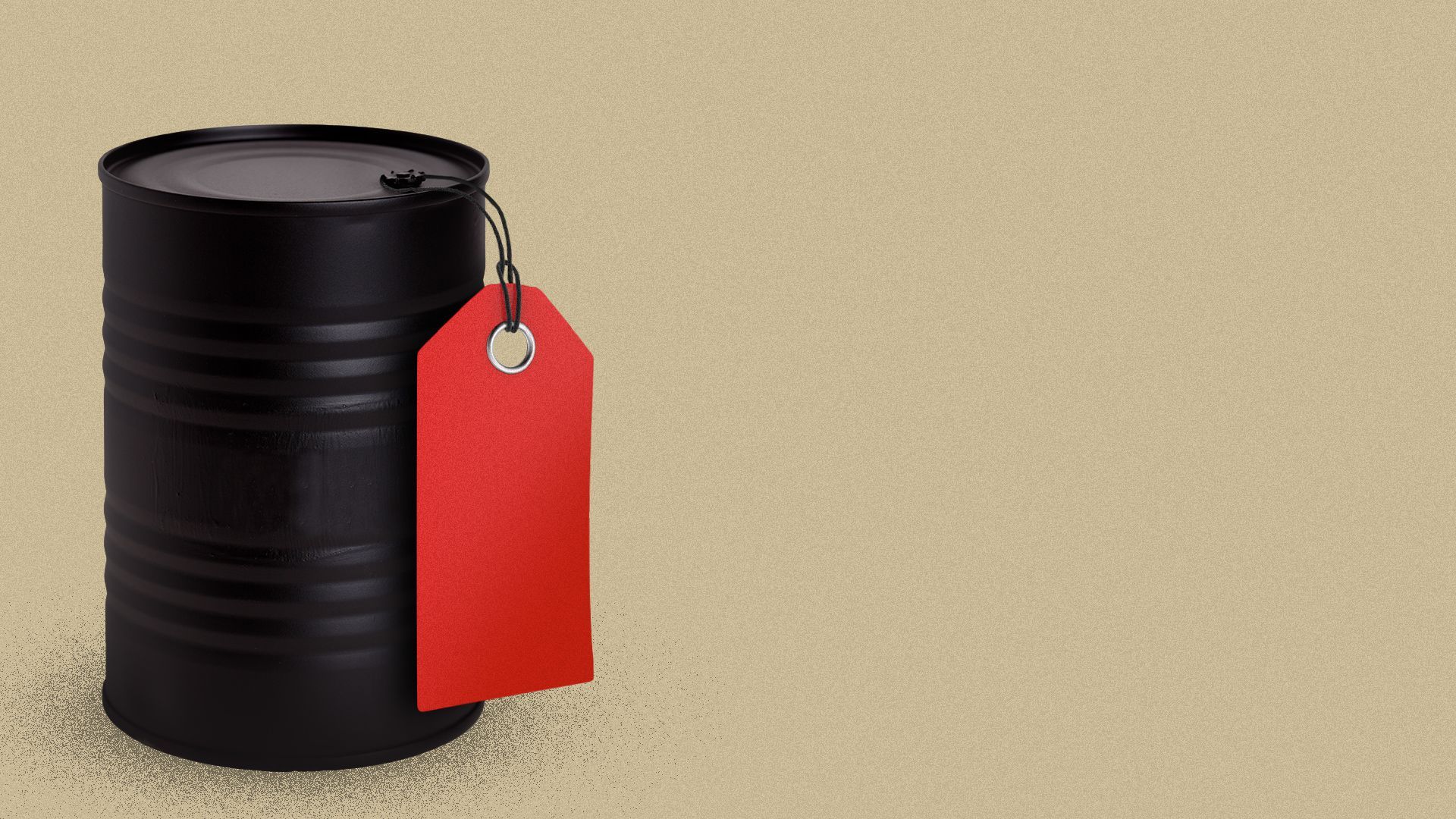| | | | | | | Presented By Walmart | | | | Axios Markets | | By Emily Peck and Matt Phillips · Dec 06, 2022 | | 🌮 Tuesday. Still early enough in the week to accomplish things! Emily here. Today Matt's back with the latest on the oil market. And I'm starting to think about books. Specifically, what to read over the holidays. - The latest possibility: "Chip War," by Chris Miller, which covers the drama behind one of the most mission-critical industries of our time, and was just named Business Book of the Year by the Financial Times. What's on your reading list? Email us some ideas.
Today's newsletter is tk words, tk minutes. | | | | | | 1 big thing: The West's answer to OPEC |  | | | Illustration: Aïda Amer/Axios | | | | The Russian oil price cap that went into effect yesterday could, over time, be an important Western counterweight to OPEC in determining world oil prices, Matt writes. Driving the news: After months of wrangling, the mechanism to try to cap prices of Russian crude oil shipped by sea went into effect yesterday. - Parties to the deal include the G7, the European Union and Australia, all of whom agreed that the highest price they'd pay for Russian oil would be $60 a barrel.
- For its part, Russia has rejected the idea of the price cap, though in practice its pariah status means it's selling oil on the global market for less than $60 a barrel, analysts say.
The price cap is designed to limit windfall profits Russia might reap from energy prices that have surged because of its invasion of Ukraine. - But it's also supposed to provide incentives for Russia to keep producing the oil which the world economy still needs. India and China are now buying most Russian crude.
The big picture: No one knows how effective the new price-capping plan will be at achieving those goals. - But the birth of a buyers club formed by the world's richest nations to coordinate their purchasing decisions in pursuit of specific prices still amounts to a major moment for world oil markets.
- While Russia is its current focus, such a group could perhaps be a plausible counterweight to OPEC, the cartel of oil-producing countries that has tried to maximize revenues for its members since it was established in 1960.
What they're saying: "If you're OPEC, you're looking at this and you're saying, 'Wait. You know, I'm not sure this Russian-focused tool couldn't be used against us,'" Kevin Book, an analyst at energy research firm ClearView Energy Partners, tells Axios. - Similarly, analysts from Rystad Energy noted yesterday that "the general view among OPEC countries is that the price cap idea sets a bad precedent and could be implemented against that group in the future."
Yes, but: U.S. policymakers are keen to stress that the current price-cap coalition is focused only on Russia, rather than the broader oil markets. What we're watching: How rising tensions between OPEC and the West could play into the oil cartel's closely watched decisions on output in the coming months. (After holding a virtual meeting Sunday, OPEC and its allies, including Russia, voted to stick with its previously agreed-upon production targets.) - Oil-producing nations such as Saudi Arabia are trying to simultaneously manage longstanding defense relationships with the U.S. (where officials want an increase in output), growing linkages to authoritarian countries like Russia and China — and an uncertain outlook for crude oil demand due to China's unsteady economy.
|     | | | | | | 2. Catch up quick | | 🔎 The FTC is probing several crypto firms over ads. (Bloomberg) ⬆️ TSMC will more than triple its investment in Arizona manufacturing plants, to $40 billion. (Reuters) |     | | | | | | 3. Why you should ignore the Dow |  Data: YCharts; Chart: Axios Visuals The Dow Jones Industrial Average has now, officially, lost substantially all of its utility as a gauge of how the stock market is doing. - It took long enough, Axios' Felix Salmon writes.
Why it matters: The Dow has a certain atavistic appeal, dating back to the days when computers didn't exist and trying to get a feel for the fortunes of the overall stock market was labor-intensive and nontrivial. Today, however, it's a solution in search of a problem. Driving the news: The DJIA is a pretty terrible market bellwether. Many years it veers away from the S&P 500 by about 5 percentage points; this year, it's even less accurate, outperforming the market by a whopping 9.5 percentage points year-to-date. How it works: The DJIA is an average, not an index — it literally just averages the nominal share prices of 30 stocks. If one of the constituents does a 4-for-1 share split, for instance, then overnight that company loses 75% of its weight in the Dow. - At current weightings, UnitedHealth Group has 3.5 times the weighting of Apple, and 18 times the weighting of Intel.
- It also has infinity times the weighting of companies like Alphabet, Amazon or Berkshire Hathaway, none of which have ever been included in the average.
The big picture: The absence of big tech stocks — many of which have fallen substantially this year — has caused the Dow to massively overstate how well the market as a whole is faring. The bottom line: Given its methodology, it's hardly surprising that the Dow is not fit for purpose. The surprise is that it continues to have currency in financial media as something relevant or interesting. |     | | | | | | A message from Walmart | | Walmart helps save families up to 75% on insulin | | |  | | | | Since June 2021, families across America have saved more than $15 million on insulin. Thanks to Walmart's low-cost private brand, shoppers can save up to 75% off the cash price of branded insulin. Learn more about how Walmart helps families live better. | | | | | | 4. The big split |  Data: Institute for Supply Management; Chart: Axios Visuals There's a growing split between two major segments of the economy: manufacturing and services, Emily writes. What's happening: Economic activity in the service sector grew in November, slightly above analysts' expectations, per the Institute for Supply Management's latest survey of activity at these businesses — which includes companies in retail, health care and transportation. The big picture: Manufacturing is more sensitive to financial conditions, wrote Pantheon Macroeconomics in a note yesterday. Plus, people are now spending less money on goods and more on experiences. - Folks are drawing down savings accumulated over the past two years. "That should keep service sector growth in the black for now," according to Pantheon.
|     | | |  | | | | If you like this newsletter, your friends may, too! Refer your friends and get free Axios swag when they sign up. | | | | | | | | 5. Charted: 📉 Cooling bond yields |  Data: ICE BofA High Yield Index via FRED; Chart: Axios Visuals Ever since the October CPI release showed inflation cooling more than expected, buyers have been stepping back in to lower-rated corporate debt, Axios' Kate Marino writes. - In the month since that mood-shifting data came out, the average yield on high-yield bonds has retreated by about a full percentage point.
The big picture: This is super helpful for investment banks that are stuck holding billions of debt backing leveraged buyouts that they haven't been able to sell to investors. - A return of buyers to the bond market means some of that paper is catching a bid, reports Axios' Mike Flaherty.
But, but, but: The exception? Twitter debt. Bond investors still want no part of it. Read more on Axios Pro: Twitter left out of bank debt revival |     | | | | | | A message from Walmart | | Walmart helps families save on the things they need most | | |  | | | | Over 37 million Americans have diabetes. With Walmart, they can save up to 75% compared to the cash price of branded insulin. This adds up to more than $15 million saved across America since June 2021. Learn more about how Walmart helps families live better. | | | | 🍬1 thing Matt Likes: Cinnamon candies. Having come down with COVID for the first time last week, my doc prescribed me the anti-viral Paxlovid. I'm feeling much better now, thanks. A downside to the drug, however, is the awful metallic taste it leaves in your mouth. (It's like your tongue has been chromed.) Luckily, through the miracle of Google, I discovered a treatment—cinnamon candies. And in my case, that means the seasonally available holiday sweet Brach's Cinnamon Imperials that my wife usually stocks up on this time of year. I can attest that they're a delicious, though temporary, antidote to Paxlovid mouth. ✨ Today's newsletter was edited by Kate Marino and copy edited by Lisa Hornung. |  | | Why stop here? Let's go Pro. | | | | | | Axios thanks our partners for supporting our newsletters. If you're interested in advertising, learn more here.
Sponsorship has no influence on editorial content. Axios, 3100 Clarendon Blvd, Arlington VA 22201 | | | You received this email because you signed up for newsletters from Axios.
Change your preferences or unsubscribe here. | | | Was this email forwarded to you?
Sign up now to get Axios in your inbox. | | | | Follow Axios on social media:    | | | | | |












No comments:
Post a Comment